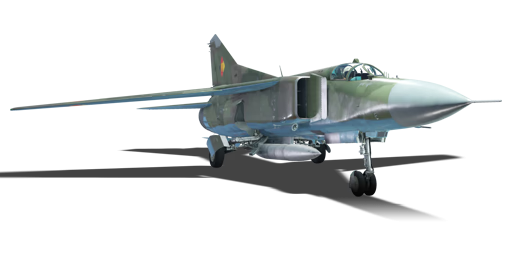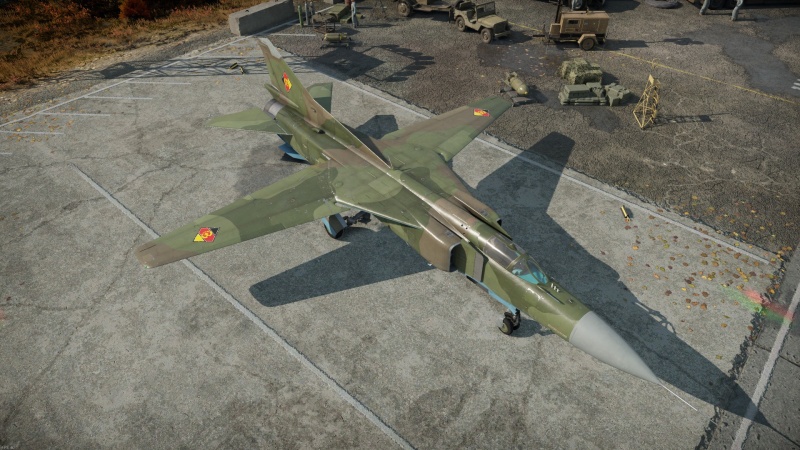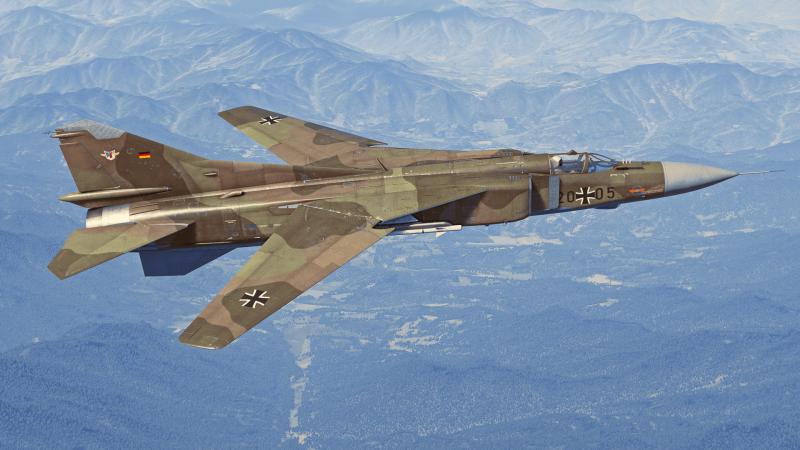MiG-23MF (Germany)
| This page is about the jet fighter MiG-23MF (Germany). For other versions, see MiG-23 (Family). |
Contents
Description
The ◊MiG-23MF is a gift rank VII German jet fighter with a battle rating of 11.3 (AB) and 11.0 (RB/SB). It was introduced during Update "Winged Lions" as a reward for the 2021 Operation W.I.N.T.E.R. event.
The MiG-23MF is an export modification of the Soviet MiG-23M. In this modification, the avionics were changed in favour of more budgetary and somewhat simplified systems. The MiG-23MF was delivered to all the main countries of the Warsaw Pact, as well as to the Arab states of the Middle East, Africa, India and Cuba.
The MIG-23MF inherits all the main characteristics from the original - good top speed, a very good climb rate, a variable sweep wing and a large array of weaponry. The disadvantages also remained: a limited number of countermeasures, a limited number of weapon suspension nodes and rather mediocre manoeuvrability at transonic speeds.
General info
Flight performance
| Characteristics | Max Speed (km/h at 13,000 m) |
Max altitude (metres) |
Turn time (seconds) |
Rate of climb (metres/second) |
Take-off run (metres) | |||
|---|---|---|---|---|---|---|---|---|
| AB | RB | AB | RB | AB | RB | |||
| Stock | 2,339 | 2,329 | 16000 | 35.6 | 35.6 | 147.4 | 140.4 | 750 |
| Upgraded | 2,380 | 2,358 | 34.5 | 35.0 | 194.4 | 170.0 | ||
Details
| Features | |||||
|---|---|---|---|---|---|
| Combat flaps | Take-off flaps | Landing flaps | Air brakes | Arrestor gear | Drogue chute |
| X | ✓ | ✓ | ✓ | X | ✓ |
| Limits | ||||||
|---|---|---|---|---|---|---|
| Wings (km/h) | Gear (km/h) | Flaps (km/h) | Max Static G | |||
| Combat | Take-off | Landing | + | - | ||
| 1470 | 630 | N/A | 508 | 473 | ~12 | ~5 |
| Optimal velocities (km/h) | |||
|---|---|---|---|
| Ailerons | Rudder | Elevators | Radiator |
| < 665 | < 650 | < 700 | N/A |
Engine performance
| Engine | Aircraft mass | ||||||
|---|---|---|---|---|---|---|---|
| Engine name | Number | Basic mass | Wing loading (full fuel) | ||||
| Tumansky R-29-300 | 1 | 11,155 kg | 395 - 445 kg/m2 | ||||
| Engine characteristics | Mass with fuel (no weapons load) | Max Takeoff Weight | |||||
| Weight (each) | Type | 10m fuel | 20m fuel | 30m fuel | 35m fuel | ||
| 1,780 kg | Afterburning axial-flow turbojet | 12,367 kg | 13,462 kg | 14,615 kg | 15,195 kg | 18,400 kg | |
| Maximum engine thrust @ 0 m (RB/SB) | Thrust to weight ratio @ 0 m (WEP) | ||||||
| Condition | 100% | WEP | 10m fuel | 20m fuel | 30m fuel | 35m fuel | MTOW |
| Stationary | 7,950 kgf | 10,494 kgf | 0.85 | 0.78 | 0.72 | 0.69 | 0.57 |
| Optimal | 8,268 kgf (1,400 km/h) |
12,987 kgf (1,400 km/h) |
1.05 | 0.96 | 0.89 | 0.85 | 0.71 |
Survivability and armour
Examine the survivability of the aircraft. Note how vulnerable the structure is and how secure the pilot is, whether the fuel tanks are armoured, etc. Describe the armour, if there is any, and also mention the vulnerability of other critical aircraft systems.
Modifications and economy
Armaments
| Ballistic Computer | |||
|---|---|---|---|
| CCIP (Guns) | CCIP (Rockets) | CCIP (Bombs) | CCRP (Bombs) |
| |
|
|
|
Offensive armament
The MiG-23MF (Germany) is armed with:
- A choice between two presets:
- 1 x 23 mm GSh-23L cannon, belly-mounted (200 rpg)
- 1 x 23 mm GSh-23L cannon + 12 x large calibre countermeasures
Suspended armament
The MiG-23MF (Germany) can be outfitted with the following ordnance presets:
- Without load
- 2 x R-13M1 missiles
- 4 x R-13M1 missiles
- 4 x R-3S missiles
- 6 x R-60MK missiles
- 2 x R-23R missiles
- 2 x R-23T missiles
- 64 x S-5K rockets
- 64 x S-5K rockets
- 4 x S-24B rockets
- 2 x Kh-23M missiles
- 16 x 100 kg OFAB-100 bombs (1,600 kg total)
- 4 x 250 kg FAB-250M-62 bombs (1,000 kg total)
- 2 x 500 kg FAB-500M-62 bombs (1,000 kg total)
- 2 x ZB-500 incendiary bombs
Custom loadout options
| 1 | 2 | 3 | 4 | ||
|---|---|---|---|---|---|
| 100 kg OFAB-100 bombs | 4 | 4 | 4 | 4 | |
| 250 kg FAB-250M-62 bombs | 1 | 1 | 1 | 1 | |
| 500 kg FAB-500M-62 bombs | 1 | 1 | |||
| ZB-500 incendiary bombs | 1 | 1 | |||
| S-5K rockets | 16, 32 | 16 | 16 | 16, 32 | |
| S-24B rockets | 1 | 1 | 1 | 1 | |
| Kh-23M missiles | 1* | 1* | |||
| R-3S missiles | 1 | 1 | 1 | 1 | |
| R-13M1 missiles | 1 | 1 | 1 | 1 | |
| R-23R missiles | 1† | 1† | |||
| R-23T missiles | 1† | 1† | |||
| R-60MK missiles | 1 | 2 | 2 | 1 | |
| Delta-NG | 1* | ||||
| * It is required to equip the Delta-NG targeting pod with the Kh-23M missiles † R-23R and R-23T missiles cannot be mixed, only one type may be carried across hardpoints | |||||
Usage in battles
Air battles
Low altitude, high speed, side of the map. Try to get as much speed as possible maintaining a very low altitude and go to the right if you want a more head-on engagement or to the left if you want a side/back of the enemy attack position (in a majority of maps players go to their left). Better used with a squadron, the MiG-23MF can eliminate several enemy aircraft if played right with 3 teammates and using the all-aspect IR-guided R-23T missile.
High altitude, high speed, together with your team, BVR. Fly along with your team, maintain a high altitude until all enemy aircraft are below you, then make surprise attacks on enemies that are busy, normally use the R-23R to destroy the high-altitude F-4s or F-104s with BVR missiles.
No matter which tactic you choose, it is recommended to engage your enemy from their front hemisphere, since you can carry all-aspect IR missiles. This way it leaves your enemy less time to react and dodge the missiles. Also, since both the R-60Ms and the R-23Ts have a relatively wide FOV, it is recommended to lock the enemy using your IRST before engaging the missile lock to slave the missile, and better utilise their wide FOV. Only use the R-60Ms at close range, around 1.5 km. They perform best under such range, and it also gives your enemy less reaction time to release the countermeasures, since R-60Ms are easily tricked by flares.
When in a 1-vs-1 situation, try to use your great low-speed performance to trick the enemy into low speeds, especially when against Phantoms. When your speed drops below 400 km/h, manually control the wing to the most frontal position to improve your manoeuvrability.
Pros and cons
Pros:
- Relatively high cruising and top speeds
- Extremely good climb rate
- Manoeuvres better than most of its opponents (such as the Phantoms and other MiG-23s/27s)
- Excellent air-to-air payload, having a wide array of missiles for almost all situations
- Decent air-to-ground payload available
- Large calibre countermeasures are very effective, one to two salvos will be required to evade any missile
- Stock payload includes 2 R-13M1 AAMs
- Can use its radar ballistic computer to hit targets with the cannon beyond the aim assist range (770 m)
- CCIP for rockets allows to deliver quick and very accurate rocket bursts at designated targets, especially in mixed battles
Cons:
- Underwhelming instantaneous turn rate, cannot pull some extreme manoeuvres easily
- Somewhat prone to stalling, especially after getting hit in one of the wings
- Loses quite a lot of speed in turns
- Bleeds a large amount of energy with its wings swept
- Relatively low countermeasures count (12)
- Low ammunition count and low muzzle velocity for the GSh-23L cannon
- Negative-G manoeuvres at high speeds could cause a wing rip, even for a few seconds
History
The Mikoyan-Gurevich MiG-23 was a Soviet supersonic fighter aircraft developed in the 1960s. It was designed to replace the MiG-21, and was the first Soviet aircraft to feature variable sweep wings, which allowed it to operate at both high and low speeds. The MiG-23 was developed in multiple variants, with the MiG-23MF being one of the most successful and widely used.
The MiG-23MF, also known as the Flogger-B, was an upgraded variant of the original MiG-23 that entered service in 1972. It was powered by a more powerful R-35F-300 engine and was equipped with a better fire control system. The aircraft was armed with a GSh-23L twin-barrel 23mm cannon and a variety of air-to-air missiles, including the R-60 and R-23.
The MiG-23MF saw significant combat use in the Middle East, particularly in the Iran-Iraq War and the Soviet-Afghan War. In the Iran-Iraq War, MiG-23MFs were used by both sides, with Iraq operating a large number of the aircraft. The MiG-23MF proved to be a capable fighter in this conflict, with Iraqi pilots claiming numerous air-to-air kills against Iranian F-14 Tomcats and F-4 Phantoms.
In the Soviet-Afghan War, the MiG-23MF was used primarily for ground attack missions, as the rugged terrain and limited air defenses of Afghanistan made air-to-air combat rare. The aircraft was effective in this role, as its speed and maneuverability allowed it to evade ground-based defenses and strike targets with precision.
Despite its successes, the MiG-23MF had several notable production issues. The aircraft had a short service life due to the high stresses placed on its airframe by its powerful engine and variable sweep wings. The aircraft's maintenance requirements were also high, as its complex systems and avionics required frequent servicing.
Overall, the MiG-23MF was an important aircraft in Soviet and international air forces during the Cold War era. It was a capable fighter and ground attack aircraft, and saw significant combat use in multiple conflicts. However, its production issues and short service life meant that it was eventually phased out of service in many countries, with newer and more advanced aircraft taking its place.
Media
- Videos
- Skins
See also
Links to the articles on the War Thunder Wiki that you think will be useful for the reader, for example:
- reference to the series of the aircraft;
- links to approximate analogues of other nations and research trees.
External links
| Mikoyan-Gurevich Design Bureau (Микоя́н и Гуре́вич Опытное конструкторское бюро) | |
|---|---|
| Fighters | MiG-3-15 · MiG-3-15 (BK) · MiG-3-34 |
| I-225 | |
| Jet fighters | MiG-9 · MiG-9 (l) |
| MiG-15 · MiG-15bis · MiG-15bis ISh | |
| MiG-17 | |
| MiG-19PT | |
| MiG-21F-13 · MiG-21PFM · MiG-21S (R-13-300) · MiG-21SMT · MiG-21bis | |
| MiG-23M · MiG-23ML · MiG-23MLD | |
| MiG-27M · MiG-27K | |
| MiG-29 · MiG-29SMT | |
| Export/Licensed | ␗MiG-9 · ␗MiG-9 (l) |
| ◊MiG-15bis · ◔MiG-15bis · J-2* | |
| MiG-17AS · ◔MiG-17PF · J-4* · Shenyang F-5* | |
| ◊MiG-19S · J-6A* | |
| ◄MiG-21 SPS-K · ◊MiG-21MF · ◔MiG-21MF · ▄MiG-21bis · ◔MiG-21bis-SAU · ◊MiG-21bis-SAU · ◊MiG-21 "Lazur-M" · ▄MiG-21 Bison · J-7II** | |
| ◊MiG-23BN · ◊MiG-23MF · ◔MiG-23MF · ◊MiG-23MLA | |
| ◔MiG-29 · ◊MiG-29 · ◄MiG-29G | |
| *Licensed and domesticated with Chinese designations. | |
| **Unlicensed, reverse-engineered and domesticated with Chinese designations. | |
| See Also | Shenyang · Chengdu |
| Germany jet aircraft | |
|---|---|
| |
Luftwaffe |
| He 162 | He 162 A-1 · He 162 A-2 |
| Me 163 | Me 163 B · Me 163 B-0 |
| Ho 229 | Ho 229 V3 |
| Ar 234 | Ar 234 B-2 · Ar 234 C-3 |
| Me 262 | Me 262 A-1a · Me 262 A-1a/Jabo · Me 262 A-1a/U1 · Me 262 A-1/U4 · Me 262 A-2a |
| Me 262 C-1a · Me 262 C-2b | |
| |
LSK |
| Fighters | ◊MiG-15bis · ◊Lim-5P · ◊MiG-19S |
| ◊MiG-21MF · ◊MiG-21bis-SAU · ◊MiG-21 "Lazur-M" | |
| ◊MiG-29 | |
| Attackers | ◊MiG-23BN · ◊MiG-23MF · ◊MiG-23MLA |
| ◊Su-22UM3K · ◊Su-22M4 | |
| ◊IL-28 | |
| |
Luftwaffe |
| F-84 | ◄F-84F |
| F-86 | ◄CL-13A Mk 5 · ◄CL-13B Mk.6 · ◄F-86K |
| F-104 | ◄F-104G |
| F-4 | ◄F-4F Early · ◄F-4F · ◄F-4F KWS LV |
| G.91 | ◄G.91 R/3 · ◄G.91 R/4 |
| Tornado | ◄Tornado IDS WTD61 · ◄Tornado IDS MFG · ◄Tornado IDS ASSTA1 |
| Other | Alpha Jet A · ◄Sea Hawk Mk.100 |
| Ex-LSK | ◄MiG-21 SPS-K · ◄MiG-29G · ◄Su-22M4 WTD61 |
| |
Swiss Air Force |
| ◌Hunter F.58 · FFA P-16 | |







